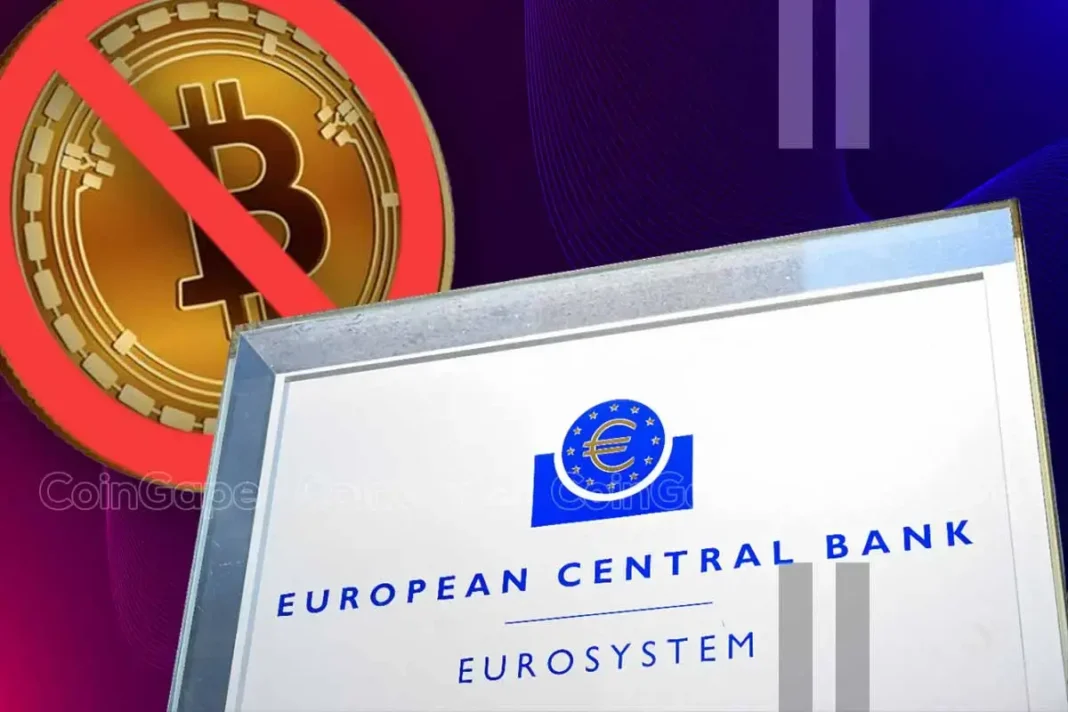Fears about the ECB Bitcoin ban have swelled since a controversial report’s release. Analyst Tuur Demeester warns that the report’s negative portrayal of Bitcoin could justify harsh ECB Bitcoin regulation, including potential bans. The recent European Central Bank paper, “Distributional Consequences of Bitcoin,” has undoubtedly created controversy among most cryptocurrency advocates.
Demeester thinks this is the most aggressive attitude toward Bitcoin central authorities showed. For him, it is a kind of “declaration of war”. The framing could open the door to restrictive legislation, such as severe taxes or outright bans on Bitcoin ownership.
ECB Bitcoin Ban Possible, Analyst Cites ‘Luddite’ Argument
Could an ECB Bitcoin ban be on the horizon? The ECB publication criticizes how Bitcoin fares in wealth distribution. The very early adopters benefit from appreciation in its value at the cost of later adopters. In this respect, the report claims that all such value growth causes a widening wealth gap. Also, early investors can gain a superior economic position.
In contrast, there could be little Bitcoin supply left for new investors, and entry would be expensive. This line of argument, however, deviates from earlier criticisms. These have often targeted the volatile nature of Bitcoin and its potential use in criminal activities.
However, one should bear in mind that, in just six days, starting from September 6, BTC price rose by 15%. Between September 16 and 26, BTC it went up by 14%. Considering this massive volatility analyst are predicting Bitcoin’s price hitting $75K in the next ten days of October.
Demeester further adds that the paper’s focus on distributional inequality is a “luddite argument” since it ignores technological importance of Bitcoin. He likens Bitcoin to other innovative technologies, such as the internet or petroleum, subject to early adopter advantages that eventually spread to expected benefits.
2/ Rather than praising bitcoin as a tech paradigm shift à la petroleum and the internet, the authors introduce the blatantly luddite argument that “early adopters” … “increase their real wealth and consumption” … “at the expense of [latecomers]”. pic.twitter.com/Fug0gnCxgf
— Tuur Demeester (@TuurDemeester) October 19, 2024
ECB Bitcoin ban could happen because ECB doesn’t acknowledge that Bitcoin can be the paradigm-shifting technological change. Instead it calls for measures that could stunt its growth or make it nonexistent. The paper says that the dynamics of policies are important because they would hamper Bitcoin’s price from going up or restrict its usage to protect societal cohesion.
The Existential Threat to Central Banks
The paper reflects a growing recognition among central banks of the potential threat from decentralized crypto to TradFi. At this juncture, the ECB cites mainly the risks to financial stability. This especially regards EMDEs, where conditions such as high inflation and currency depreciation make people adopt cryptocurrencies.
One should not forget that just recently, the ECB resorted to a third rate cut this year influenced by the weak growth outlook and the inflation scare.
In this respect, Bitcoin usually serves as a store of value or a means of exchange to fill in the gaps when local financial systems are underdeveloped.
The central bank, therefore, insists that if cryptocurrency is increasing, monetary policy and economic management may be significantly impaired. This could call for ECB Bitcoin ban since it compares it with the situation where crypto displaces local currencies in economies plagued by monetary instability.
As Demeester points out, these are not entirely new concerns but are now more apparent than ever. For him, this report signals that Bitcoin is now an important political and economic issue in its own right and is likely to feature in future policy debates and electoral campaigns.
He warns that owners may face future restrictions on ownership and usage that their principles of individual rights and financial sovereignty will defy.
A Clash of Ideologies
The ECB report and Demeester’s response illustrate a more profound ideological divide. The paper aligns with the principles of centralized economic management and collective financial stability. Demeester, therefore, frames the issue in which the integrity of individual financial rights squares off against the overreach of central planning.
He believes such efforts to rein in Bitcoin reflect fundamental hostility toward decentralized systems that empower individuals rather than institutions. He also thinks the negative sentiment could lead to the ECB Bitcoin ban for that reason.
As Bitcoin and other cryptocurrencies increasingly join the mainstream of global finance, this ideological battle could eventually gain momentum.
For now, though, Demeester’s response puts cryptocurrency proponents in mind that a good deal of vigilance will still be called for. Therefore, regulatory and policy battles are on the horizon.
The possible ECB Bitcoin ban has raised several questions about the future of digital assets. The questions regard their function within the financial ecosystem, and how politicians could shape new ECB regulation. This debate is still very far from over. Bitcoin’s protagonists and detractors are still clashing in a continuous, intense battle against the implications Bitcoin couldy have for economics and society.
Disclaimer: The presented content may include the personal opinion of the author and is subject to market condition. Do your market research before investing in cryptocurrencies. The author or the publication does not hold any responsibility for your personal financial loss.


✓ Share: